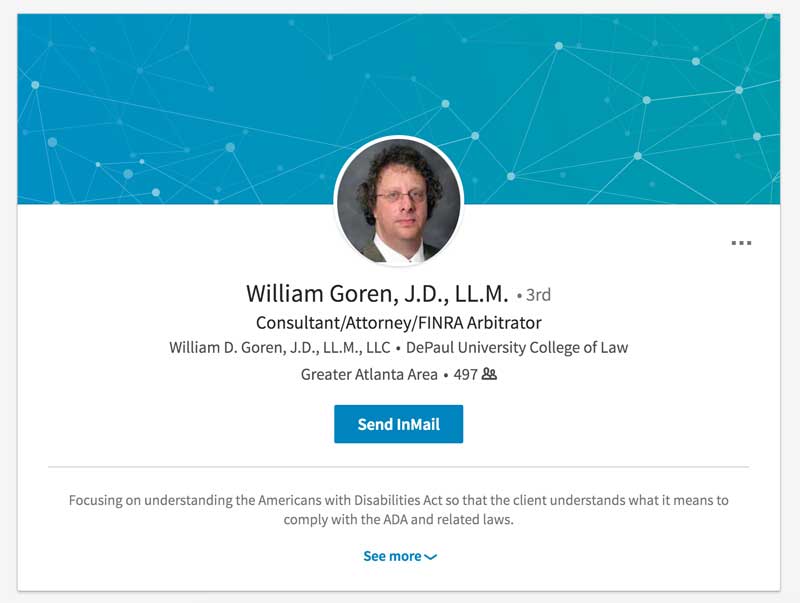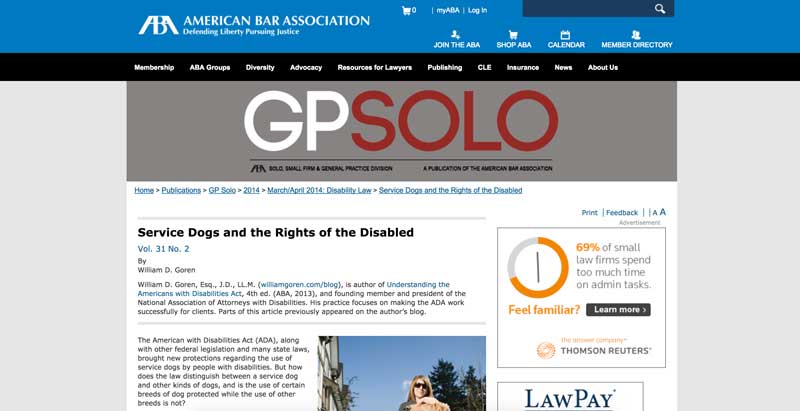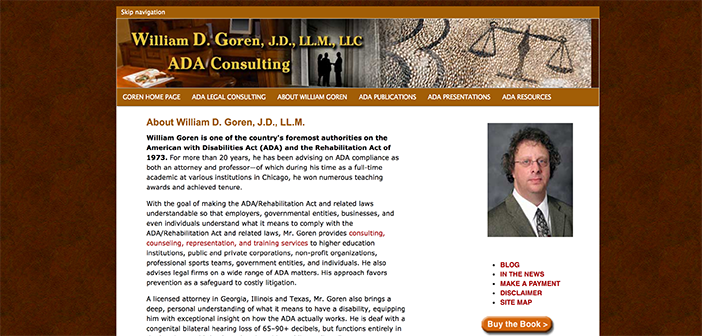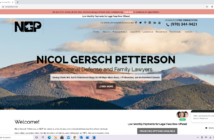“Virtually all of my business comes from my blog”, says this Atlanta specialist with a legal consulting practice.
William Goren started his career in law as a litigator at a law firm in Chicago. He didn’t like litigating, and has been a consultant ever since, specializing in the Americans with Disabilities Act.
Goren, who is deaf but can hear with a combination of hearing aids and lip reading, appears in court regularly as an expert witness and litigation strategist. He files suits every once in a while when litigation can’t be avoided, but he has made a career of teaching clients how to stay out of court.
It is a career that has allowed him more time with his family and the freedom to move from state to state. He’s a member of the bar in Illinois, Texas and Georgia. He most recently moved to Atlanta to follow his wife, who works for the Centers for Disease Control.
Goren, who has been solo for all but the first three years of his career, says solo practitioners in other niches might want to consider adding legal consulting to their portfolios. The first step, he says, is to find a niche, then “establish yourself as a thought leader” in that narrow area of law. Next, start writing about it, and recycle your previously published material to other thought leaders, reporters covering your area of law and prospective clients.
Becoming a Thought Leader
For Goren the path toward becoming a nationally known expert in the ADA started in the 1990s on the pioneering online legal forum Counsel Connect. He was a regular participant in discussions on the listserv, and early on told the administrators that it needed an ADA forum. “They said why don’t you moderate it,” which he proceeded to do for much of the 90s. “That’s where the whole ‘establishing myself as a thought leader’ got started,” he says.
The forum led to a book, Understanding the ADA, which was first published by the American Bar Association in 2000 and is now in its fourth edition. “It gave me the right to say, ‘I wrote the book on the subject’,” says Goren, who followed up the book with his law blog, also called Understanding the ADA, which he started in 2011. Starting in 2014, it was named to the ABA’s top 100 legal blogs list three years in a row.
A blog is no magic bullet for a solo law practice. Traffic will be a trickle for a long time, if his personal experience is any indication, Goren says. But he insists, “If you don’t have a blog, you should start one. A solo without a book and without a blog might have a hard time. How are people going to find you otherwise? And you need to have a niche. If you don’t have a niche, don’t bother. You’re going to burn out and not going to make it.”
Goren goes on to say, “If you have a niche, you might as well teach it to others.” He has taught in law schools, at one point making tenure, while honing skills that have translated well to consulting, namely “being able to write in an accessible matter, and being able to make presentations at the level of your audience, whatever that may be,” Goren says.

Keys to Successful Blogging
By some accounts, the heyday of law blogging has passed, as online conversations about law have moved to social media sites such at LinkedIn and Twitter. Goren believes blogs still are one of the best ways to publicize a law practice. His has been a key to the success of his legal consulting business, he says. “It’s something that levels the playing field with larger firms and helps you establish a presence.”
To make and keep the commitment that a blog requires, he adds, “You have to love to write. If you don’t love to write, don’t do it.” Goren insists lawyers should write their own blog posts, and not farm that task out. “You have to be yourself. You have to find and know your voice. You also have to put in the time to make it right,” he says. He spends three to five hours on each blog post.
You also have to post regularly, he says. Once a week is good enough. “But readers must know, generally speaking, that there will be a new blog post on a regular basis.” Goren offers one other pointer: “On my blog, there is always a paragraph that says, OK, here is what you can take away from this blog entry. The reader needs a takeaway.”

Spreading the Word
For your blog develop a following, Goren says “it is really helpful to develop relationships with other bloggers that you respect. And cite to them whenever you can.” Goren also writes about the ADA for other trade publications and bar association newsletters.
He proactively disseminates what he writes, using LinkedIn and other platforms. On LinkedIn he has over 500 followers, a group that includes ADA coordinators for governmental entities, universities and other institutions, business owners, human resources professionals, attorneys and other people involved with disability rights. He also is a member of half a dozen LinkedIn groups including one for people involved in the hospitality industry and another for accessibility consultants. Goren follows the discussion in those groups and weighs in from time to time.
LinkedIn may not directly lead to business but it helps draw attention to his blog, his presentations and his writing for other publications. He has set up his blog so that every time he adds a new post, it automatically gets posted on his profile page and goes out to his followers. Thus, his LinkedIn presence mostly takes care of itself. “It’s mainly keeping your profile current with your publications and presentations and then making a comment in one of the groups every now and then,” he says. “Just making a comment here and there can get the word out.”

Courting the Press
Goren is also proactive about reaching out to reporters who write about the ADA, identifying them with help from Google Alerts, which he has set up to send him links to articles that mention the law.
“I am very aggressive about letting people in the media know that I can be a resource for them,” Goren says. “I have now written almost 300 separate blog entries on all kinds of issues concerning the ADA. So when I get a Google Alert and there is a reporter who has written on an issue that I have blogged about, I quite frequently email that reporter and say, ‘Hey, I read your article and I enjoyed it. You might be interested in this blog entry of mine. If I can be a resource for you, let me know.’ My practice is all about being a thought leader, so cultivating people who write articles in your subject area is an important task,” Goren says.
Goren has developed another list of contacts through his active engagement in bar groups. That is more for the camaraderie, which solos can’t get enough of, than for business development and law-practice marketing, he says. But he often follows up with people he has met through bar activities by sending them an email with a link to a blog post relevant to them. That couldn’t have hurt getting his blog onto the ABA top 100 law blogs list for three years in a row.
Getting his blog to that point took lots of patience. “If you want to blog, it is a real long game,” Goren cautions. “I started blogging in December 2011 and at first I was getting maybe five hits a day. Now I get 300+ views and close to 200 visitors a day. Virtually all of my business comes from my blog,” he says.
“If you’re going to blog to get business, it will happen but it may take two or three years before you start seeing it,” Goren says. “So I would not blog because you want to get business. You should blog because that’s who you are and that’s what you want to do.”




